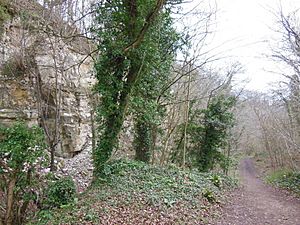Coaley Wood Quarries facts for kids
| Site of Special Scientific Interest | |

Former quarries in Coaley Wood
|
|
| Area of Search | Gloucestershire |
|---|---|
| Coordinates | 51°41′43″N 2°18′37″W / 51.695188°N 2.310292°W |
| Interest | Geological |
| Area | 4.85 hectare |
| Notification | 1974 |
Coaley Wood Quarries is a special place in Gloucestershire, England. It covers about 4.85 hectares, which is roughly the size of five football fields. This area was officially recognized in 1974 as a Site of Special Scientific Interest (SSSI).
Being an SSSI means the site has important natural features. Coaley Wood Quarries is special because of its unique geology. It helps scientists learn about Earth's past.
This site is located within the Cotswolds Area of Outstanding Natural Beauty. This means it's a beautiful landscape that is protected for its natural beauty. The area is also listed as a Regionally Important Geological Site (RIGS). This highlights its importance for understanding the geology of the region.
Contents
Discovering Ancient Life: The Geology of Coaley Wood Quarries
Coaley Wood Quarries is like a giant history book made of rock. It's full of amazing fossils from the Lower Jurassic period. This was a time when dinosaurs roamed the Earth, about 180 million years ago!
The Cephalopod Bed
One of the most exciting parts of the quarries is a rock layer called the Cephalopod bed. This layer is packed with fossils of ancient sea creatures. These fossils are incredibly well-preserved.
Amazing Ammonites
You can find many excellent examples of ammonites here. Ammonites were sea animals with spiral shells, a bit like snails or nautiluses today. They lived in the oceans millions of years ago. Finding these fossils helps scientists figure out the exact age of the rocks. Different types of ammonites lived at different times. The ammonites found here show that these rocks are from an early part of the striatulum Subzone. This is a very specific time period in Earth's history.
Exploring Rock Layers
The site also has "sunken lane cuttings." These are like natural trenches that cut through the ground. They show different layers of rock underneath. These cuttings reveal the Cotswold Sand Formation below the Cephalopod bed. In one thin, separate layer of sandstone, scientists have found rare ammonites called Haugia. These rare finds make the site even more special for geological study.

